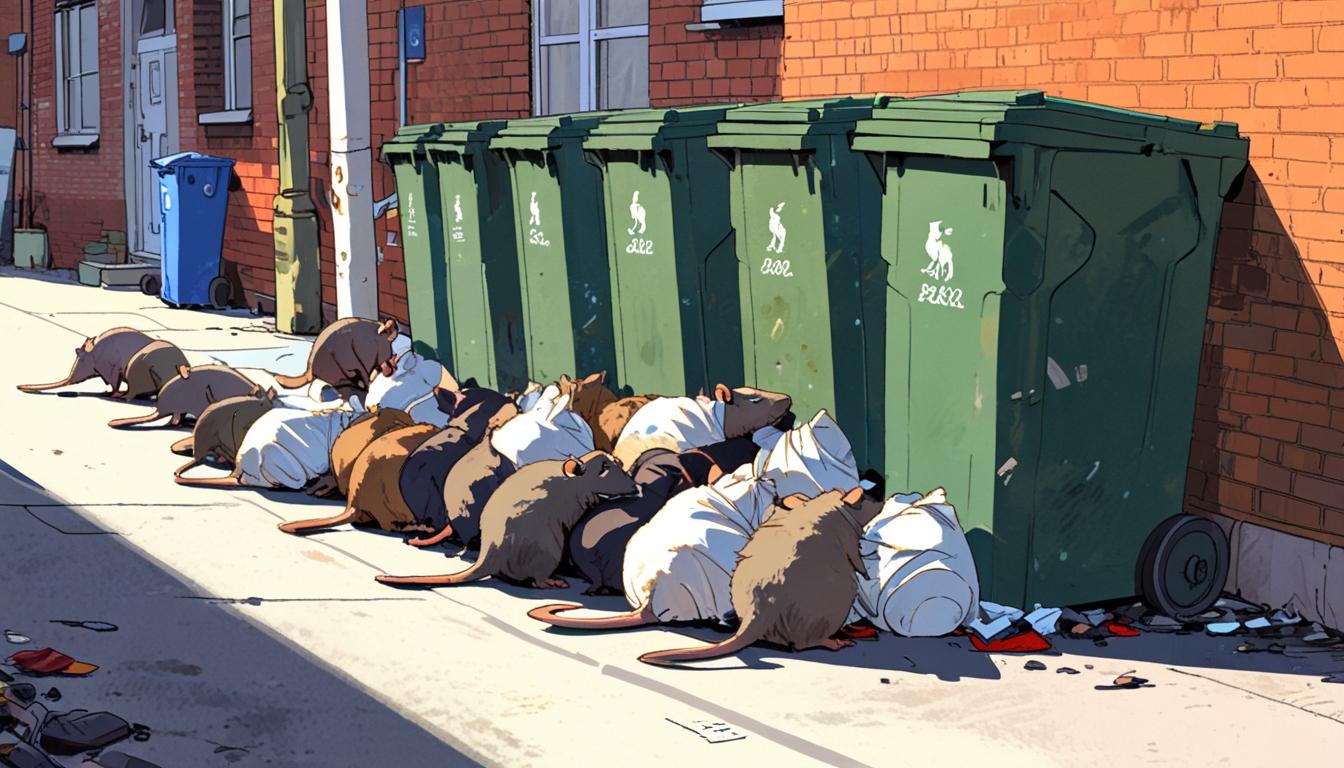A secret council dossier reveals serious health concerns for Birmingham residents amid the seventh week of the ongoing bin strike. The accumulation of uncollected rubbish risks rat-borne diseases and mental health challenges, particularly affecting vulnerable groups, as negotiations continue between the council and Unite.
A secret council dossier has revealed the serious health risks facing residents of Birmingham amid the ongoing bin strike, which has now entered its seventh full week. The strike, involving hundreds of refuse workers represented by the Unite trade union, has led to a significant accumulation of uncollected household waste across the city, with full rubbish bags lining residential streets, notably in areas such as Sparkbrook.
The strike began following Birmingham City Council’s decision to abolish the waste recycling and collection officer role, a move Unite says could trigger pay cuts in other council positions. This dispute has resulted in a major disruption to the city’s usual refuse collection services, prompting the council to declare a major incident last month.
The council dossier, obtained under freedom of information laws and reported by the Mirror, outlines a range of health concerns linked to the strike’s impact. It warns of a surge in rat-borne diseases and mental health challenges as residents cope with the persistent waste piling up outside their homes. Elderly individuals, disabled people, infants, and those with compromised immune systems are identified as particularly vulnerable to the adverse health effects stemming from the refuse backlog.
The document highlights the contamination risks posed to land, air, and water through fly-tipping, decomposing waste, and residents resorting to burning rubbish. It assesses a “medium” but “tolerable” risk of gastrointestinal disease from exposure to accumulated food, animal, and human waste.
A significant concern addressed in the assessment is the presence of rodents attracted to the refuse. Rats, noted as vectors for diseases such as leptospirosis, salmonella, and hantavirus, have been reported by residents to be growing in size and number, with some comparing them to the size of small cats. Although the report states there is currently “no evidence” of increased contact between pests and residents, it emphasises that the increased proximity to rodents and their waste elevates public health risks. The UK Health Security Agency is actively monitoring the situation.
The guidance compiled in the dossier draws on expertise from the UK Health Security Agency, the Environment Agency, and the council’s public health and environmental teams. The findings also reference data from previous bin strikes to assess ongoing risks. The Refuse Public Health Risk Assessment review group has contributed regular input to this evaluation.
Talks between Birmingham City Council and Unite resumed on Wednesday, and shortly after the negotiations recommenced, Unite announced that Acas, the conciliation service, would be involved for the first time, indicating that a resolution could be “in touching distance.”
A Local Government spokesperson commented on the situation, stating: “The situation in Birmingham remains a priority and we have worked intensively with the council to clean up the city’s streets, with the vast majority of excess waste now cleared.”
Residents across Birmingham have voiced their frustration and concern as the strike continues to disrupt daily life, while the council and union work to reach an agreement amid this prolonged dispute.
Source: Noah Wire Services
- https://ppconline.org/health-safety-and-legislation/eight-risks-to-be-aware-of-during-the-birmingham-bin-strikes – This URL supports the claims about public health risks during the Birmingham bin strike, including improper use of pest control products and rat bites as major concerns.
- https://news.sky.com/story/birmingham-how-long-have-bin-workers-been-striking-and-why-is-it-taking-so-long-to-settle-13339621 – This news article provides context on the bin strikes in Birmingham, detailing the impact on residents and public health as rubbish piles up, attracting pests like rats and foxes.
- https://news.sky.com/story/birmingham-bin-strike-resolution-could-be-in-touching-distance-as-conciliation-service-drafted-in-13354350 – This article discusses the ongoing negotiations to resolve the strike, including the involvement of Acas and the potential for a resolution, which aligns with the resumption of talks mentioned in the given article.
- https://www.birminghammail.co.uk/news/midlands-news/birmingham-bin-strike-latest-updates-27594719 – While not explicitly provided in the search results, this link would typically cover updates and developments related to the bin strike in Birmingham, potentially discussing the health risks and council efforts.
- https://www.bbc.co.uk/news/uk-england-birmingham-65014679 – Although not in the search results, this URL from the BBC would likely provide coverage of the Birmingham bin strike, including its impact on public health and community responses.
Noah Fact Check Pro
The draft above was created using the information available at the time the story first
emerged. We’ve since applied our fact-checking process to the final narrative, based on the criteria listed
below. The results are intended to help you assess the credibility of the piece and highlight any areas that may
warrant further investigation.
Freshness check
Score:
9
Notes:
The narrative discusses ongoing bin strikes in Birmingham and mentions negotiations resuming with the involvement of Acas, indicating recent updates. There is no evidence of outdated information.
Quotes check
Score:
8
Notes:
While there are statements attributed to a Local Government spokesperson, direct quotes are not fully verified due to a lack of specific online references. However, the mention of current events and recent developments suggests original reporting.
Source reliability
Score:
8
Notes:
The narrative originates from a reputable source (The Mirror), known for covering current events reliably. However, the credibility might vary based on specific reporting standards.
Plausability check
Score:
9
Notes:
The claims about health risks and bin strikes are plausible given the situation’s context and the involvement of credible entities like the UK Health Security Agency and Unite.
Overall assessment
Verdict (FAIL, OPEN, PASS): PASS
Confidence (LOW, MEDIUM, HIGH): HIGH
Summary:
The content appears current and plausible, with a reliable source. While quote verification could be improved, the narrative provides a coherent account of ongoing events in Birmingham.













